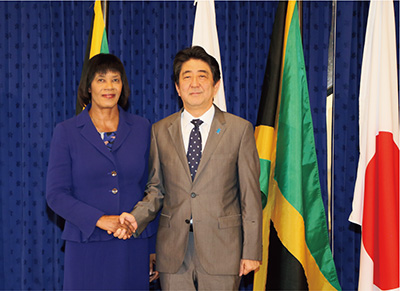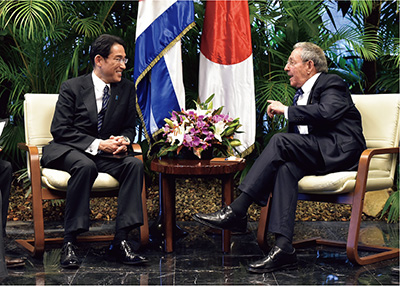Diplomatic Bluebook 2016
Chapter 2
Japan’s Foreign Policy that Takes a Panoramic Perspective of the World Map
Section 3 Latin America and the Caribbean
Overview
Latin America and the Caribbean region is a key partner for Japan, economically as well as in terms of strengthening and maintaining international order based on the rule of law. Although economic growth in the region has slowed since 2011 against the backdrop of falling commodity prices and the slowdown of major economies outside the region, Latin America and the Caribbean have a population of approximately 600 million, with a combined GDP of 6 trillion US dollars (approximately 2.5 times larger than that of ASEAN). The region is also a producer of mineral resources (including rare metals), energy and food, and a significant number of Japanese companies have established operations. Moreover, with the “rule of law” and democracy firmly established in nearly all Latin American and Caribbean countries, the region has a strong presence in the international community. Japan and Latin America and the Caribbean region have traditionally maintained a very friendly relationship. With over 2.13 million Japanese descendants, or “Nikkeis,” living in Latin America, the human and historical bonds between Japan and the region run deep. Moreover, Japan has long maintained economic ties with Latin America and the Caribbean as Asia’s largest investor.
In July and August 2014, Prime Minister Abe paid official visits to the region. During this trip, the Prime Minister announced three guiding principles of Japan’s diplomacy for Latin America and the Caribbean: (1) Progress together (strengthening economic relations); (2) Lead together (working together in the international arena); and (3) Inspire together (promoting people-to-people exchanges, cultural and sports exchanges, and other exchanges). Based on these principles, Japan is strengthening the ties with the region.
 Summit meeting between Prime Minister Simpson-Miller and Prime Minister Abe (September 30, Jamaica ; Photo: Cabinet Public Relations Office)
Summit meeting between Prime Minister Simpson-Miller and Prime Minister Abe (September 30, Jamaica ; Photo: Cabinet Public Relations Office) Talks between Chairman of State Council Raul Castro and Foreign Minister Kishida (May 2, Cuba)
Talks between Chairman of State Council Raul Castro and Foreign Minister Kishida (May 2, Cuba)In terms of strengthening economic relations, Japan has been engaged in creating a better business environment for Japanese companies operating in the region through establishing legal frameworks such as EPAs and investment treaties as well as consultations with governments of partner countries based on these frameworks. The Investment Agreement between Japan and Uruguay was signed in January, and the Investment Agreement between Japan and Colombia came into force in September. Also, Tax Treaty between Japan and Chile was signed in January 2016. In October, an agreement in principle was reached on the Trans-Pacific Partnership (TPP) Agreement. Stronger economic ties are expected with Mexico, Chile, and Peru, participating states in the TPP agreement. Japan is promoting development assistance that employs Japanese technology, as increased demand for infrastructure in such areas as urban transportation and energy is expected within the region as a result of the economic growth. Japan has also been enhancing cooperative relationships with countries with abundant resources and food, in order to secure a stable supply of such resources and food.
With regard to increasing cooperation in the international arena, Japan has been collaborating with Latin American and Caribbean countries in addressing various issues, such as sustainable growth, environment and climate change, nuclear disarmament and non-proliferation, as well as UN Security Council reform. At the same time, Japan has been reinforcing cooperation and dialogue with regional organizations such as the Caribbean Community (CARICOM), which has influence in the international community.
As for people-to-people exchanges frequent mutual visits by key officials took place, as in the previous year. In May, Foreign Minister Kishida became the first Japanese Foreign Minister to visit Cuba, and in September, Prime Minister Abe became the first Japanese Prime Minister to visit Jamaica. The government has strengthened exchange at all levels with the region through the invitation of, not only key officials, but also young officials and Japanese descendants from the region (See 2-2-1 (2)).
